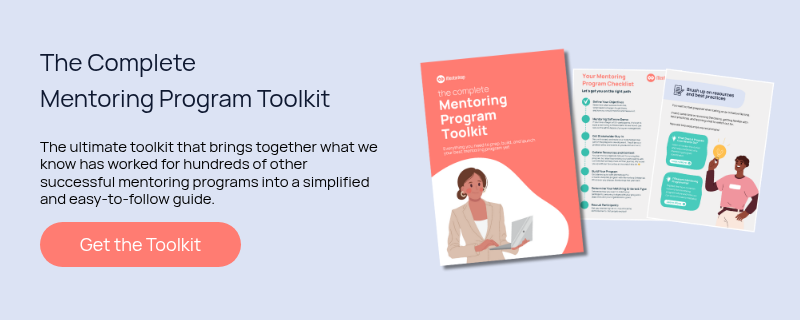Researching mentoring? Here’s your comprehensive guide to the most current mentoring statistics, updated January 2026.
📊 The Big Picture: Why Mentoring Matters Now More Than Ever
Before we dive into the numbers, here’s what you need to know: In 2024, global employee engagement hit concerning lows, with only 31% of U.S. employees engaged at work and disengagement costing the global economy $438 billion in lost productivity. Against this backdrop, mentoring has emerged as one of the most effective strategies for retention, development, and engagement.
🏢 Fortune 500 Companies & Mentoring Adoption
When looking at the success of Fortune 500 companies, one strategy stands out: mentoring programs are now nearly universal at the top.
Adoption Rates by Company Size:
- 98% of ALL U.S. Fortune 500 companies have mentoring programs
- 100% of Fortune 50 companies have mentoring programs
- 96% of Fortune 100 companies have mentoring programs
- 90% of Fortune 250 companies have mentoring programs
Source: MentorcliQ 2024 Mentoring Impact Report
The Business Impact:
Companies with mentoring programs significantly outperform those without:
- Median profits are over 2X higher for companies with mentoring programs
- 3% median employee growth for companies with mentoring vs. 33% median decrease for those without
- Between 56-71% of all organizations now use mentoring to some degree
Sources: MentorcliQ, SHRM
💡 What People Really Think About Mentoring
The mentoring gap is real, and it’s hurting businesses:
The Awareness-Access Gap:
- 76% of people think mentors are important, but only 37% actually have one
- People with mentors are happier at their current jobs than those without
Source: Forbes
How Mentoring Relationships Form:
- Only 14% of mentor relationships started by formally asking someone to be a mentor
- 61% of relationships developed naturally
- Most people opt for same-sex mentors: 69% of women, 82% of men
Source: Forbes
The Mutual Benefits:
- 87% of mentors and mentees feel empowered and have developed greater confidence
- 82% believe mentoring fosters meaningful connections across departments
- 84% report that mentoring provides two-way inspiration
- 97% of individuals with a mentor find the experience valuable
- 89% of those who have been mentored go on to mentor others
Sources: Women Ahead, National Mentoring Day
Impact on Mental Health & Job Satisfaction:
- Mentors experienced lower levels of anxiety and described their jobs as more meaningful
- 89% of employees with mentors say colleagues value their work vs. 75% without mentors
Sources: Harvard Business Review, MentorcliQ
💼 Workplace Mentoring: L&D Strategy That Works
Mentoring has risen in priority as a key learning and development strategy:
Strategic Importance:
- Mentoring is now #4 on the list of L&D strategies that teams are prioritizing—up from #6 in 2021 (the largest rank increase of any strategy)
- 90% of organizations are concerned about retention and recognize mentorship as a key engagement tool
- Companies with more effective mentors are 4X more likely to provide specific skills training for mentors
Sources: Donald H Taylor Global Sentiment Survey, LinkedIn Workplace Learning Report, LHH
📈 Career Progression: The Mentoring Advantage
The data is clear, mentoring accelerates careers for both mentees AND mentors:
Salary & Promotion Impact:
- 25% of mentees had a salary grade change vs. 5% without mentoring
- 28% of mentors had a salary grade change vs. 5% without mentoring
- Mentors were promoted 6X more often than non-participants
- Mentees were promoted 5X more often than non-participants
Source: Wharton School
Leadership Impact:
- 84% of CEOs credit mentors with helping them avoid costly mistakes
- 69% reported making more profitable decisions with mentor guidance
Source: Harvard Business Review
🔄 Employee Retention: The $1 Trillion Problem
Employee turnover is expensive. Here’s how mentoring helps stem the tide:
The Current Crisis (2024-2025):
- Only 31% of U.S. employees are engaged at work—the lowest in a decade
- 17% are actively disengaged (spreading negativity)
- Globally, only 21% of employees are engaged, down from 23% the year prior
- U.S. businesses lose nearly $1 trillion annually due to turnover
- Disengagement costs the global economy $438 billion in lost productivity
Sources: Gallup State of the Global Workplace, Yourthoughtpartner
How Mentoring Dramatically Improves Retention:
- Retention rates: 72% for mentees, 69% for mentors vs. 49% for non-participants
- 94% of employees would stay longer if offered learning and growth opportunities
- More than 4 in 10 workers without mentors considered quitting in the past 3 months vs. 25% with mentors
- 91% of workers with mentors report being happy at work (57% “very satisfied”)
Sources: Wharton School, LinkedIn Learning Report, CNBC/SurveyMonkey
Real-World Success Story:
- Cox Automotive’s mentoring program boosted retention to 79% over two years vs. 67% company-wide
- Participants were 23% more likely to be promoted
Source: Chronus
Compensation & Value Perceptions:
- 79% with mentors feel well-paid vs. 69% without
- 89% with mentors believe contributions are valued vs. 75% without
Source: CNBC/SurveyMonkey
🌈 Diversity, Equity, Inclusion & Belonging (DEIB)
Mentoring is one of the most effective strategies for building diverse, equitable, and inclusive workplaces:
Overall DEIB Impact:
- Mentoring boosted minority representation at management level by 9-24% (compared to -2% to 18% with other diversity initiatives)
- Improved promotion and retention rates for minorities and women by 15-38% vs. non-mentored employees
- 63% of companies with diversity-focused mentoring programs see positive impacts on gender diversity
- Nearly 80% of employees want to work for companies prioritizing DEI
- 95% of mentees see value in having a mentor from a different background
- Employees with formal mentors are 75% more likely to believe their organization supports career development
Sources: Forbes, Deloitte, MLDC, Gallup
Cross-Cultural Mentoring:
- Mixed gender or race/ethnicity mentoring relationships provide more career benefits
- Same-demographic mentoring relationships provide more psychosocial benefits
- 72% of DiversityInc Top 50 companies have reverse mentoring programs
- Companies with culturally diverse leadership are 33% more profitable
Sources: MLDC, DiversityInc, McKinsey
👩 Women in the Workplace
The Gender Mentoring Gap:
- 63% of women have never had a formal mentor
- Only 24% of women leaders have had a formal mentor vs. 30% of men
- Only 54% of women report ever being asked to be a mentor
- 69% of women choose same-gender mentors (vs. 82% of men)
- 23% of men receive more on-site mentorship and sponsorship vs. 16% of women
Sources: Stylist, DDI, McKinsey Women in the Workplace
Women’s Perceptions of Mentoring:
- 67% rate having a mentor as extremely important to career advancement
- 78% of women in senior roles have served as formal mentors
- 80% of women who mentor cite supporting other women as their primary motivation
Sources: DDI
What Matters to Women Mentors:
- Time commitment: 75%
- Subject matter expertise: 54%
- Relationship to mentee: 54%
- Gender of mentee: only 2%
- Age of mentee: only 4%
Source: DDI
Barriers & Solutions:
- 53% of women felt they lacked adequate training to be formal mentors
- Women are 10% more likely to accept mentoring requests when organizations have formal programs
- 77% of women in tech with mentors stay in the industry after 3 years
- Women with mentors are more likely to negotiate for promotions and pay raises
Sources: DDI, Anita Borg Institute/Mentorink, Catalyst/WomenTech
Business Impact:
- Organizations with women in top management roles add 6.6% to market value
- In strong DEI companies, 35% of leadership is women vs. 25% in weak DEI companies
🏳️🌈 LGBTIQA+ Workforce
The Mentoring Gap:
- Over 1.3 million at-risk LGBTQ youth have never had a formal mentor
- Of 1.6 million at-risk LGBTQA+ youth, only ~600,000 have ever had a mentor
- Fewer than 1 in 5 (~300,000) have had a formal mentor
- Trans people are less likely to have sponsor support: 21% vs. 32% of cisgender people
Sources: Williams Institute, McKinsey
Workplace Representation:
- LGBTQ+ women are underrepresented at every management level
- LGBTQ+ women: 2.3% of entry-level → 1.6% of managers (and declining at senior levels)
- Workplace LGBTI+ networks reduce concerns about being “out” affecting career progression by 5 percentage points (14% to 9%)
👥 Millennials & Gen Z: The Future of Work
The workforce is rapidly changing. Understanding what these generations need isn’t optional—it’s essential for organizational survival.
📱 Millennials: Still the Largest Generation at Work
Current State:
- Millennials comprise over 75% of the workforce as of 2025
- 79% see mentoring as crucial to career success
- Unfortunately, 63% say their leadership skills aren’t being fully developed
- Only 28% feel organizations make full use of their current skills
Sources: Forbes, HuffPost, Deloitte Millennial Survey
The Mentoring Effect:
- Millennials with mentors are twice as likely to stay 5+ years (68% vs. 32%)
- With a mentor, they’re 21-23% more likely to report job satisfaction
- 49% are considering quitting within 2 years
- Top quit reasons: lack of advancement opportunities (35%) and learning opportunities (28%)
Sources: Deloitte, CNBC/SurveyMonkey
What They Want:
- 91% consider career progression a top priority when job hunting
- 93% find skill development crucial to career progression
- 53% have been disappointed by lack of development training at new jobs
- Less than 50% say they’ve had learning opportunities in the past year
Sources: Robert Walters, GoRemotely
🚀 Gen Z: The Rising Workforce (2024-2025 Reality Check)
Current Demographics:
- Gen Z makes up 18% of the U.S. workforce (~30 million people)
- Projected to reach 30% by 2030
- Expected to be the majority of the workforce by 2035
- 2024 marked first time Gen Z outnumbered Baby Boomers in the workforce
Sources: MentorcliQ, CAKE.com Gen Z Study
The Mentoring Imperative:
- 83% believe workplace mentors are important, but only 52% have one
- 86% actively seek mentorship and guidance
- 88% value on-the-job learning and practical experience
- 76% see learning as critical to career advancement
- 82% want supervisors to help them set goals
- 83% want supervisors who care about their life
- 73% are motivated by caring supervisors
- With a mentor: 21-23% more likely to report job satisfaction
Sources: Adobe/MentorcliQ, Deloitte 2025 Gen Z Survey, CAKE.com, Springtide Research, SHRM
What They Want:
- 64% cite career growth opportunity as top priority
- 87% want jobs where they can learn a lot
- 73% prefer one-on-one teaching
- 77% say company diversity affects their decision to work there
- Only 6% aim for traditional leadership positions (redefining success around work-life balance)
Sources: Deloitte 2025, Ryan Jenkins Blog, The 74 Million
🚨 Gen Z’s Unprecedented Challenges (2024-2025)
The Economic Reality:
- Global entry-level job postings (0-2 years experience) declined 29% since January 2024
- Junior tech roles: down 35%
- Logistics roles: down 25%
- Finance roles: down 24%
- Only 45% hold traditional full-time roles
- 31% of full-timers would prefer a side hustle for experience and income
Sources: Randstad Gen Z Workplace Blueprint, CAKE.com
Financial Insecurity Crisis:
- 48% don’t feel financially secure in 2025 (vs. 30% in 2024)
- Over 50% live paycheck to paycheck
- Over 33% struggle to pay basic living expenses monthly
- Only 41% expect to own a home one day
- ~40% are concerned about retiring comfortably
Sources: Deloitte 2025 Gen Z Survey, McKinsey/The Interview Guys
Job Mobility & Confidence:
- Average tenure: 1.1 years (vs. 1.8 for Millennials, 2.8 for Gen X)
- 31% plan to switch jobs within 6 months (up from 25% in 2024)
- 22% have already left a job (nearly double Millennials)
- Confidence in ability to succeed plunged from 59% in 2024 to 39% in 2025
- 61% would leave for better mental health benefits
Sources: Randstad, TriNet, The Interview Guys
The Opportunity: Despite challenges, Gen Z is adapting and upskilling:
- 75% are using AI to upskill—far more than any other generation
- They’re growth-hunting, not job-hopping
- When given visible career paths and mentorship, retention improves dramatically
Sources: Randstad, MentorcliQ
🤝 Industry Associations & Professional Organizations
Professional associations face unique challenges in attracting and retaining members, especially younger professionals. Mentoring programs have emerged as a powerful solution that benefits both members and associations.
The Membership Challenge
Current Reality:
- 87.3% of professional associations agree that attracting younger members is a growing problem
- 49% of current association members belong to Gen X or Millennial generations
- Associations must demonstrate value that outweighs membership costs (typically $150-$1,500 annually)
- Members are increasingly early-career professionals seeking specific development opportunities
Sources: Horizons Study/Chronus, BestOrgs
What Members Want
Younger Professionals Seek:
- Career development and advancement opportunities
- Expanding their professional network within the industry
- Acquiring new skills through practical learning
- Quick answers to career questions
- Collaborative learning experiences
The Mentoring Connection:
- 75% of Millennials want a mentor and deem mentoring crucial to success
- 60% of generations look to professional associations specifically to fill their mentoring and development needs
- Members who participate in mentoring programs (as mentor or mentee) are significantly more likely to retain membership
Sources: PGi Study/Chronus, Together Platform, Art of Mentoring
Benefits for Professional Associations
Member Recruitment & Retention:
- Mentoring programs provide tangible value that attracts new members
- Word-of-mouth promotion from satisfied mentoring participants spreads through professional networks
- Enhanced sense of belonging keeps members engaged year after year
- Formalized programs demonstrate commitment to member success
Source: Art of Mentoring
Leadership Pipeline Development:
- Expands the talent pool for association leadership roles (committees, special interest groups, boards)
- Strengthens the industry/profession as a whole by building leadership capabilities
- Younger members with mentors network more easily within the association
- Creates succession planning for association governance
Sources: Art of Mentoring, People360AI
Professional Development:
- Supports continuing education and accreditation requirements
- Helps members become more conscious of development needs and professional standards
- Strengthens relationship between association and professional members
- Provides industry-specific growth opportunities unavailable in workplace settings
Source: Art of Mentoring
What Makes Association Mentoring Unique
Key Differentiators:
- Matches professionals at different career stages within the same industry
- Offers greater potential for reciprocal learning (both parties explore new territory)
- Provides external perspective beyond current workplace
- Enables cross-organizational knowledge sharing within the profession
- Connects members who share professional identity and standards
Types of Association Mentoring Programs:
- Career mentoring (connecting students and professionals)
- Topical mentoring (building specific knowledge areas)
- Flash mentoring (short, one-time sessions for quick guidance)
- Reverse mentoring (younger members sharing current trends with senior leaders)
- Leadership development programs (combining training with mentor support)
Sources: Art of Mentoring, Chronus
Success Stories
Real Association Impact:
- Product Marketing Alliance – Product marketers advance skills learning from industry leaders
- All Raise – Helps women in tech thrive and advocate for industry change
- Standards Australia’s Young Leaders Program – Combines leadership training with ongoing mentor support to build future technical committee participants
- Women in Business and Finance – Merges leadership education with mentoring to create more gender-balanced leadership in banking and finance
Sources: Together Platform, Art of Mentoring
The Business Case
Why Associations Should Invest in Mentoring:
- Engagement – Mentoring provides reason for membership beyond dues
- Value Addition – Delivers personalized development members actually want
- Network Effects – Positive participant experiences spread through professional networks
- Retention – Engaged members in mentoring programs stay members longer
- Professional Identity – Strengthens members’ sense of belonging to their profession
- Competitive Advantage – Differentiates your association from others competing for the same members
Sources: Art of Mentoring, People360AI
Bottom Line: A well-structured mentoring program is far more than a “feel good” initiative. It offers significant returns to associations interested in engaging their member base and genuinely advancing the profession or industry they represent. As younger professionals make up an increasing proportion of potential members, mentoring programs have become essential—not optional—for association growth and sustainability.
🎯 Key Takeaways: Why This Matters
The Window Is Closing: Gen Z will be the workforce majority by 2035—that’s only 9 years away. It takes 2-3 years for employees to become fully productive and another 3-5 to develop leadership capabilities. Organizations that start building robust mentoring programs NOW will have a massive competitive advantage.
What Success Looks Like:
- 98% of Fortune 500 companies have mentoring programs
- Companies with mentoring have 2X higher profits and 3% employee growth vs. 33% decline
- 72% retention for mentees vs. 49% for non-participants
- 91% of workers with mentors are happy vs. significant drops without
The Cost of Inaction:
- $1 trillion lost annually to turnover in the U.S.
- $438 billion lost globally to disengagement
- Only 31% of employees currently engaged
- 49% of Millennials and 31% of Gen Z planning to leave
What Employees Are Demanding:
- Meaningful mentorship and guidance (83% of Gen Z, 79% of Millennials say it’s crucial)
- Career development opportunities (94% would stay longer for learning)
- Diverse and inclusive environments (80% want DEI prioritization)
- Work-life balance and mental health support (61% of Gen Z would leave for better benefits)
The data is clear: mentoring isn’t a nice-to-have—it’s a must-have strategy for attraction, retention, development, and business success in 2026 and beyond.
Thinking of running your own mentoring program?



![[Webinar Kit] Turnover Threat into Talent Triumph: Designing a mentoring program that boosts employee engagement Learn how to design a high-impact mentoring program that helps you achieve your employee engagement goals.](https://no-cache.hubspot.com/cta/default/4058869/interactive-189625368503.png)


